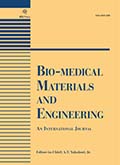Authors: Hernandez, E.P. | Oshida, Y. | Platt, J.A. | Andres, C.J. | Barco, M.T. | Brown, D.T.
Article Type:
Research Article
Abstract:
The use of a provisional restoration is an important phase in the treatment of the dental prosthetic patient. A good provisional restoration should satisfy the following requirements: pulpal protection, positional stability, ease in cleaning, accurate margins, wear resistance, dimensional stability, and serve as a diagnostic aid in treatment assessment and esthetics. There is a tendency for discoloration, occlusal wear, and fracture that eventually leads to unnecessary repair. Heat‐processed and reinforced methacrylate‐based resins have been used to improve the mechanical and physical properties of provisional restorations. Among various improvements, the interpenetrating network crosslinked PMMA (IPN) has been shown to have superior
…mechanical properties if manufactured through a dough compression molding process at 130°C. However, there have been no published data that relate with the use of this material for fixed provisional restorations. The objective of this study was to compare four methyl methacrylate‐based resins for provisional crowns and bridges with varying processing cycles, including JET [self‐cure], ACRALON [heat‐cured], titanium dioxide filled PMMA [heat‐cured], and IPN [heat‐cured denture tooth resin]. Properties studied included transverse strength, toughness, rigidity, and hardness. From the results of this study the following conclusions can be made: the IPN group may have had a lower degree of conversion as demonstrated by decreased strength, toughness, and hardness data as compared with Acralon. Increasing the polymerization cycle of unmodified Acralon resin causes a significant increase in strength.
Show more
Keywords: Interpenetrating network crosslink, PMMA, self‐cure, heat‐cure, mechanical properties, provisional restorations
Citation: Bio-Medical Materials and Engineering,
vol. 14, no. 1, pp. 107-122, 2004
Price: EUR 27.50





